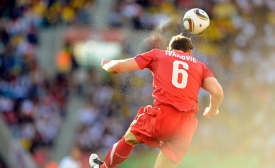sports exchange
Sport is a gigantic and powerful medium for the international spread of information, reputations and relationships that are the essence of public diplomacy. The money spent world-wide on sport dwarfs what any government spends on public diplomacy. The size of the global audiences for sport and the audience’s level of interest exceed those of any other subject matter, including political news and the movies. The nature of sport—in its human striving for excellence and in its competition, its winners and losers—carries its own messages.
Using sports as a means to build stronger people-to-people connections and empower young people worldwide, the U.S. Department of State’s Bureau of Educational and Cultural Affairs and the National Basketball Association (NBA) announced today that NBA legends...will travel to Africa as sports envoys
“It’s important because when I was first asked to spread goodwill through sport, I understood the meaning of it intellectually, but I didn’t fully understand it until I went to China,” Ripken wrote in response to a question asking why his envoy work was important to him.
Over the summer, there were numerous instances of sports diplomacy in practice throughout the world.
Back in 1990, an overly excited Gavin Owen, along with his San Mateo Little League teammates, hopped on an airplane and traveled to Toyonaka, Japan as part of a Sister Cities cultural exchange program.
At that time, the program was in its 23rd year of introducing young boys to the Japanese culture using the power of baseball as a means to this introduction.

Sherine B. Walton, Editor-in-Chief
Naomi Leight, Managing Editor
Tracy Bloom, Associate Editor
Sports diplomacy builds on Secretary of State Hillary Rodham Clinton’s vision of “smart power.” It embraces the use of a full range of diplomatic tools, including sports, to bring individuals together in order to foster a greater understanding of societal norms and cultures.







